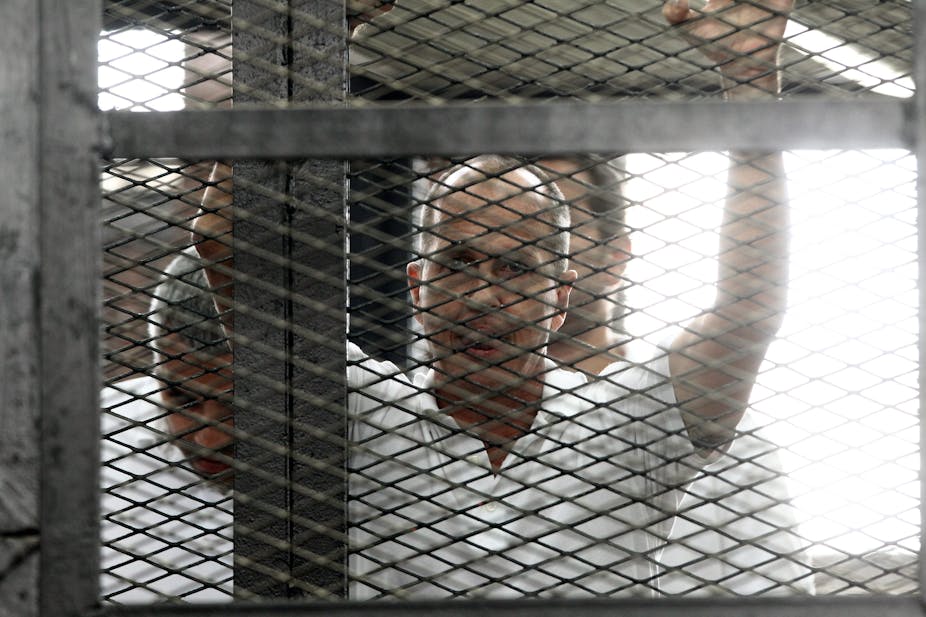The guilty verdict and jail sentence handed to Australian journalist Peter Greste and his Al Jazeera English colleagues Mohammed Fahmy and Baher Mohammed by an Egyptian court for conspiring with the Muslim Brotherhood to broadcast false reports have provoked widespread outrage. Looking beyond Egypt, can international law help free Peter Greste and his colleagues?
What violations of international law have been committed by Egypt?
Article 14 of the International Covenant on Civil and Political Rights (ICCPR), to which Egypt is a party, sets out the requirements of a fair trial, starting with the entitlement:
… to a fair and public hearing by a competent, independent and impartial tribunal.
The Human Rights Committee, which monitors the ICCPR, has said that this right is absolute, “not subject to any exception”, and that any court:
… must appear to a reasonable observer to be impartial.
Any reasonable observer would question the competence of the Egyptian court, which cannot even start its proceedings on time or maintain order. The head of Al Jazeera English, Al Anstey, has said that:
There were numerous irregularities in addition to the lack of evidence to stand up the ill-conceived allegations.
The independence and impartiality of the court has been questioned by observers, who attribute the verdict to the hostility to Qatar by new Egyptian president Abdel Fattah el-Sisi’s administration because of Qatar’s links to the Muslim Brotherhood. The Qatari government owns and finances Al Jazeera.
A fair trial must also include access by the defence to all evidence. Any appeal should review the sufficiency of the evidence. The evidence actually presented at the Al Jazeera journalists’ trial was bizarrely inadequate, including a poor recording of Gotye’s hit Somebody That I Used To Know, photos of Peter Greste’s parents on holiday, a Panorama documentary about Somalia, footage of sheep, and a clip from Sky News Arabic that none of the accused actually worked on.
The judicial and political options in Egypt for appealing this verdict do not appear to provide hope for Greste’s supporters. There is justified scepticism about the likely outcome of an Egyptian appeal process when the initial trial itself was such a parody of competent judicial proceedings.
Sisi said on Tuesday that he would not interfere in the case. Echoing a government statement on Monday insisting that the trial had adhered to due process, he said:
We will not interfere in judicial rulings.
Can international law help to reverse this gross injustice?
Prominent human rights lawyer Geoffrey Robertson QC has said that the Australian government could apply to the International Court of Justice (ICJ) to force Egypt to free Greste in the same way Australia got Japan to end its Antarctic whaling program.
Unfortunately, this avenue is not open. The ICJ is not like a domestic court which will hear any matter brought before it – its jurisdiction is limited. Australia was able to take Japan to the ICJ because both Australia and Japan broadly recognise the ICJ’s “compulsory jurisdiction” under Article 36 of the court’s statute.
While Egypt also recognises the ICJ’s compulsory jurisdiction, its acceptance, made in 1957, was specifically limited to disputes over Egyptian operation of the Suez Canal. States accepting the ICJ’s jurisdiction can apply such limits to it, and there is no way for the court to disregard them.
Even if it was possible to access the ICJ’s jurisdiction and win against Egypt, that would not greatly help Peter Greste. The average length of time for the ICJ to decide a matter is four years. Australia applied to the ICJ in the whaling case in May 2010 – the court announced its decision on March 31 this year.
There is no other international body that could make a binding decision about the Greste case. The most appropriate forum to raise this issue would be the United Nations Human Rights Council, which unfortunately concludes its current session this Friday and does not meet again until September.
The Abbott government has been regrettably inactive in the Human Rights Council. Australia is not currently a member of the council, but that does not stop us engaging actively with the council.
A cross-regional group of countries made a statement to the Human Rights Council at its last meeting in March expressing concern at the human rights situation in Egypt, referring to the need to ensure the right to fair trial. Australia was not among them. Possibly, the Australian government decided that in the light of the then-ongoing Greste trial, this was the wiser course.
Now, we can see that restraining Australia’s voice on human rights in Egypt – and more generally – has not produced the right outcome for Peter Greste. It is time for the government to consider whether it is representing Australia effectively on this and other human rights issues by maintaining our silence on them in UN forums.

